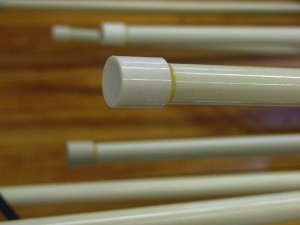Save Our GPS, Verizon, and AT&T
April 27th, 2011 by Christian(or, Dirty Tricks and Spectrum Politics)
I was on NPR today talking about LightSquared, the controversial would-be 4G broadband provider that has provoked the hyperbolic Save Our GPS campaign.

The slice of electromagnetic spectrum controlled by LightSquared is adjacent to the GPS signal, and the GPS industry has launched a public campaign to warn about the potential for interference between LightSquared and GPS. My position is that there is no way that the FCC would allow the GPS signal to be jeopardized. Here is the transcript of what I said on Marketplace Tech Report:
The GPS industry says that building these ground stations all over the place for LightSquared is going confuse the GPS receivers because they happen to be the adjacent use for those frequencies. But I have to say I think it might all may be bunk.
Worrying about GPS is sort of like saying, “The town planning board is now considering landscaping in the median of the freeway.” And then someone says, “but wait, what if they decide to destroy the freeway?” It just seems very unlikely. They know the freeway is really important. So we have the Air Force, sport fisherman, everyone who uses GPS very upset about this. But it’s not clear at all to me that the FCC would allow anything to proceed that would jeopardize the GPS signal.
UPDATE: Originally I complained about the Marketplace Tech Report abstract of the above. Now they’ve slightly changed the abstract after they read this blog post. (Thanks!) Now it’s great. It reads: “All the signals should get along just fine after the FCC’s review this summer. Sandvig says the FCC would never let anything bad happen to GPS.”
In fact, as things stand now LightSquared isn’t allowed to build anything until the GPS interference issue is resolved.
So why is everyone from Sport Fisherman to the Air Force getting all riled up about this issue? What’s the fuss?
The Register’s Bill Ray already did a great job writing about this so I’ll quote his excellent prose. LightSquared’s competitors were hoping that the FCC would rescind LightSquared’s license over GPS interference concerns. The FCC refused, “so now the general public is being courted in the hope of a less-well-informed opinion.” Ray goes on to write,
One can’t help wondering if putting a little fear and uncertainty into the heads of potential investors, threatening the entire business plan with health-and-safety concerns over GPS interference, isn’t just what the existing operators might have asked for.
The more uncertain LightSquared’s L-band network looks, the more valuable the S-band (not adjacent to GPS) licenses are that are held by companies that want to try the same business model. I’m talking about DBSD (bought by Dish last month for this spectrum) and Terrestar.
The GPS industry would be happier if there were no engineering tests at all (other than theirs) and the whole idea of this adjacent use was simply scrapped. That’s because impartial engineering tests can find all kinds of things. They could indeed find that the GPS receivers are not operating to specification.
Don’t be surprised, this kind of thing happens all the time. A few years ago I really enjoyed using my in-car Sirius satellite radio receiver because the FM retransmitter worked so well. (I could tune to a specified FM station to hear my satellite radio rather than plugging the device in with an audio jack.)
Indeed it worked well because it was over powered, and it was illegally interfering with the FM reception of all of the cars driving around me while it was making me happy. (Sirius paid a $20m fine for that and some other things.)
All sorts of noble, well-meaning people (like airplane pilots) are being pressed into service to “stand up for GPS.” It’s an emergency, they are told. “GPS Signal Interference Could Jeopardize America’s Safety,” the Coalition warns.
In fact they are being used to manipulate the value of companies that hold S-band licenses, and as a competitive weapon against new entrant LightSquared. The value of the entire electromagnetic spectrum itself has been recently quantified as around $629 billion. Dish bought DBSD explicitly for access to its S-band spectrum which might be used in a similar way to LightSquared’s license, and Dish paid $1 billion for it.
With these kind of figures, wouldn’t you expect some dirty tricks? Like a fake grassroots campaign or two? In spectrum policy, a quick punch or two below the belt when the referee isn’t looking is what we call the start of negotiation.
___
Updated: 4/27 — 5:33 p.m. Revised to reflect changes in Marketplace Tech Report abstract as noted above.


April 28th, 2011 at 11:46 pm
Think about this one, assume you had an empty lot that you didnt use and someone had a house next to you. Your neighbor with the house decides to build an addition that extends onto your property. They build it and use the addition pretty regularly. Well in 2003, the zoning board tells your neighbor the following, ” mr. Neighbor, Joe, the owner of the empty lot is applying for permits to build his house so I would suggest that sometime over the next 8 years you figure out another solution because in 2011 he wants to build his house. However, he has agreed to build around your furnace which is his property. He realizes the furnace, a small part of the addition, is critical and will work around that problem. So, tear the rest of your house down because it is on his property and he wants to use it. This is america isn’t it and he paid for his property.